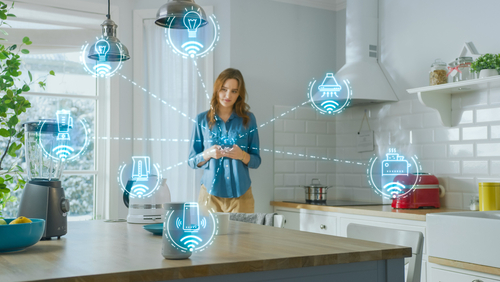7 Trends Daily
Stay updated with the latest insights and trends across various sectors.
Smart Homes: Where Convenience Meets Future Shock
Discover how smart homes blend ultimate convenience with future shock—transform your living space and embrace the tech revolution today!
The Evolution of Smart Homes: From Basic Automation to AI Integration
The concept of smart homes has undergone a remarkable transformation over the past few decades, evolving from basic automation systems to sophisticated networks powered by artificial intelligence (AI). In the early days, smart homes featured simple elements like programmable thermostats and remote-controlled lighting systems. These innovations provided convenience but lacked the intelligence to adapt to users' needs. As technology advanced, the introduction of the Internet of Things (IoT) enabled devices to communicate with each other, fostering a more connected living environment. This shift laid the groundwork for the next phase of smart home technology, which involved the integration of AI algorithms that learned from user behaviors and preferences. For a comprehensive overview of this evolution, visit Forbes.
Today, AI integration is transforming smart homes into truly intelligent environments. Smart speakers and virtual assistants can now understand complex commands, manage multiple devices simultaneously, and even predict the needs of their users through machine learning. This evolution has also seen the emergence of smart security systems that analyze patterns to enhance home safety. Homeowners can enjoy not only greater convenience but also improved energy efficiency and security. As we look to the future, experts predict that the proliferation of AI-driven home technologies will lead to even more seamless experiences, making smart homes an integral part of everyday life. For further insights into smart home technology and trends, check out The Franklin Institute.

10 Essential Smart Home Devices That Will Revolutionize Your Living Space
Embracing a smart home setup can transform your daily life, bringing unprecedented convenience and efficiency. Here are 10 essential smart home devices that will revolutionize your living space:
- Smart Light Bulbs: These energy-efficient bulbs allow you to control lighting remotely, set schedules, and even change colors to match your mood.
- Smart Speakers: Devices like the Amazon Echo or Google Home not only play music but also function as hubs for controlling other smart devices with your voice.
Continuing with our list, consider adding these innovative gadgets to your smart home arsenal:
- Smart Thermostats: Automate your heating and cooling systems for energy efficiency and comfort.
- Smart Security Cameras: Keep an eye on your property anytime and anywhere with real-time alerts and live views.
Are Smart Homes Safe? Exploring Privacy and Security Challenges in Connected Living
As the popularity of smart homes continues to rise, many homeowners are left wondering, are smart homes safe? The convenience of interconnected devices—from smart thermostats to security cameras—offers a level of comfort and automation previously unseen. However, these advanced technologies come with inherent privacy and security challenges. Cybersecurity threats, such as hacking and data breaches, can compromise personal information and jeopardize the safety of a home. Thus, it is crucial for consumers to understand the potential risks associated with fully connected living.
To enhance the security of smart homes, homeowners should take proactive measures. Implementing strong, unique passwords for each device, utilizing two-factor authentication, and regularly updating firmware can significantly reduce vulnerability. According to experts, awareness of security protocols and potential risks is essential in maintaining a safe connected environment. As the landscape of smart technology evolves, ongoing education on privacy practices and device management will be paramount in ensuring that the promise of smart homes does not come at the expense of security.